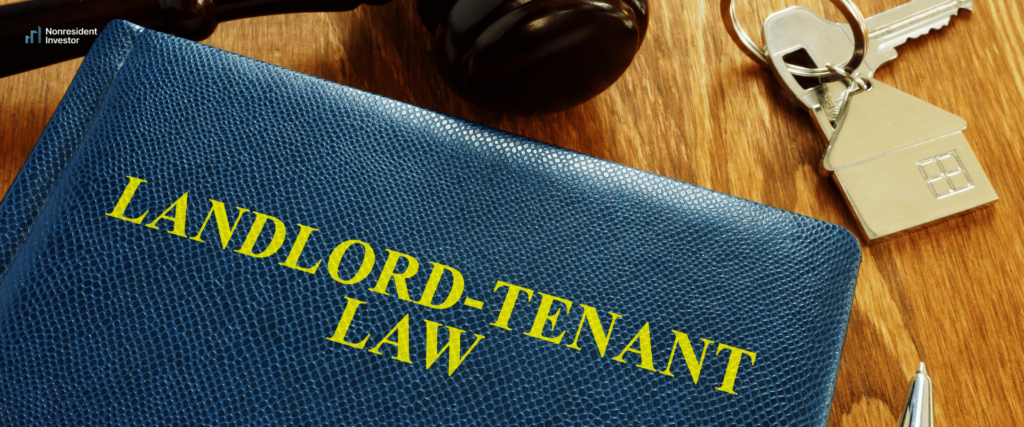Choosing a good tenant is the most critical decision foreign US real estate investors must make when handling property management. Making the right decision can significantly boost your ROI, while a wrong one can set you back months in terms of revenue.
The impact of this decision is even greater for nonresident investors who often live abroad. Living far from your property makes checking up on your tenants more complex and risky.
So if you are ever in between two minds about a potential tenant, reject them. The damage a bad tenant can cause outweighs the potential reward of a decent one.
OK, but how do you actually rent a property as a foreigner? It’s simple — by coming to an educated decision based on research. And doing a thorough background check on potential tenants is just the first step.
This article will teach you how to properly assess risk when trying to find a good tenant and check trustworthiness.
But before you can even consider renting your property, you’ll need to ensure you have a contract ready for your tenant…

Why Do I Even Need a Contract to Find a Good Tenant?
Don’t even dream of accepting a tenant without a legally-binding contract. After all, you are trying to run a business here, and having legal protection is essential for its security and longevity.
Having a contract guarantees the amount of revenue you’ll receive from your tenants. That is why most rental and lease agreements are 1-year contracts. Since investing is all about number crunching, always knowing how much you’ll earn in a year is much better than the uncertainty of month-to-month contracts.
On top of that, the value of a 1-year contract already gives you significant ROI, so it makes it easier to plan your long-term strategy. And after your contract expires, you can renew it for another year or look for another tenant.
There are many other reasons you should sign a contract with your tenant, but here are just some of the most important ones:
- It offers an excellent safety net if your tenant ends up damaging your property;
- Foreign investors have a harder time overseeing their tenants due to living abroad;
- You’ll be able to sleep soundly at night, knowing that your property is protected by law.
Yes, having a contract means your ROI will take a small hit due to taxes, but the added insurance you get from legally protecting your property and the predictability of your year-over-year revenue is more than worth the tradeoff.
What’s a Pre-Tenancy Application?
A pre-tenancy application form is a document potential tenants must fill out to apply for tenancy at your property. This form contains most of the information you will need to narrow down your choices, including:
- Their SSN (Social Security Number);
- Their current address;
- The name and contact of their previous landlord;
- And much more…
Most pre-tenancy application forms also come with a $35 fee meant to cover the expenses of a background check. That is particularly valuable for foreign investors since it’s even more critical for them to find a good tenant.

What Does a Rental and Lease Agreement Regulate?
The primary purpose of a rental and lease agreement is to define the relationship between a landlord to a T. This contract also outlines all of the tenant’s obligations so that there’s no room for misinterpretation.
Here are the most common sections found in a rental and lease agreement and what they regulate:
- Rental Terms — Rental terms define how long a rental cycle lasts (usually a month) and the conditions for its renewal.
- Utilities — This section clearly defines who is responsible for covering the expenses of all different types of utilities, including electricity, water, property maintenance, and more.
- Security Deposit — This clause defines the size and the conditions of a security deposit.
- Policies and Procedures — This section regulates many things related to property use, including the landlord’s rights to enter, property damages, use of premises and guests, and more.
- Nonstandard Rental Provisions — This clause contains basic information about check-in and check-out times, smoking rules, and additional fees (e.g., new key, lock change, lock-out fees).
- Rules & Regulations — This section outlines all the necessary rules related to rights of entry, drain and toilet usage, parking, trash removal, security deposit usage, and more.
- Pet Clause — This final section defines the rules and fees associated with keeping or having pets on the property premises.
Although having so many clauses may seem like overkill at first glance, it is not. As an investor, you should never leave anything to chance because your business and ROI depend on it.
Can I Find a Good Tenant and Finish Everything Online?
Even if you can’t be present to sign a contract with your tenants, don’t worry — you can finish everything online. Nowadays, thanks to electronic signatures, you can handle all the paperwork regardless of where you are.
However, you will still need to have someone present to handle the intricacies of welcoming the new tenants and helping them settle in. Luckily, you can always delegate that to a property manager, a friend, or an acquaintance.
How to Draft a Foolproof Rental and Lease Agreement
As mentioned above, having an extensive and detailed contract is essential to protecting your investment and minimizing risks. During the 90s, rental, and lease agreements were barely three pages long. Nowadays, they even go over 20 pages.
Our rental and lease agreement template is drafted according to Wisconsin’s real estate laws that our CEO, Luka Malkovich, uses personally. Once you start working with us, you can use it if you plan to rent out property in Wisconsin or have your legal counselor adapt it if you’re renting out elsewhere in the USA.
Now that you’re equipped with an agreement, we covered how to check your tenant before signing a contract.

5 Things to Double-Check Before Signing a Contract With a Tenant
If there’s any part of the investment process where you must do your due diligence, it’s when choosing a tenant. Renting out your property to the wrong person (or people) can lose you a lot of revenue. Here are the five questions you need to answer before signing an agreement with a tenant:
1. Do They Have a Criminal Record?
One of the most straightforward ways to eliminate a potential tenant is if they have a criminal record. Even if they are one-time offenders, it’s not worth the risk. After all, you are running a business here and must give yourself the best odds.
The most reliable way to check whether someone has a criminal record is by filing a request at the local police station. Alternatively, you can do that online or through an application, but those options usually come with a small fee ($20–$30).
Whichever method you choose, you should never skip this step.
2. What’s Their Income?
Another vital thing to check before signing a contract with a tenant is their income. Always ask them to provide proof of their earnings prior to drafting an agreement.
An unwritten rule in real estate investing states a tenant is a safe bet if the rent amounts to 30% or less of their monthly income. People whose rent exceeds 30% of their earnings are high-risk tenants and may have issues covering the rent on time.
Remember — real estate investing is all about steady cash flow, so having tenants who lag on rent (or do not pay at all) is bad for business.
3. Were They Recently Evicted?
Another big red flag is the person was evicted by a previous landlord. The easiest way to find that out is to ask them directly. However, they may lie.
That’s why a better option is to have your property manager (or agency) look into their tenancy history. They are often very well connected in the local market and will likely be able to find the information on their own.
Although getting evicted may not always be the tenant’s fault, you should still consider this point when evaluating potential risk and reward.
4. What Do Their Previous Landlords Have to Say About Them?
One of the most surefire ways to check whether a tenant is reliable is to contact their previous landlord. That way, you can get first-hand testimony of what it’s like to have them as a tenant.
So don’t hesitate to ask them where they previously stayed and get the contact number of their landlord. If they aren’t willing to give you that, that’s a red flag.
But if you’d still like to give them the benefit of the doubt, your property manager or agency can probably still find their previous landlord if they’re well-connected (and they should be).
5. Who Are Their Co-Signers?
The last thing you should always check before signing an agreement with a tenant is who their co-signers are. Since most of the financial and legal burden falls on the tenant, co-signers often stay under the radar. But that doesn’t mean they won’t cause problems.
Co-signers will also live on your property and be responsible for it. And just because your tenant came up clear on their background check doesn’t mean their co-signer will too.
In fact, if someone had a criminal record or a problematic history, they’d always aim to pass as a co-signer to avoid drawing attention. That’s why you must look into everybody who will be living on your property — no exceptions.

What’s the Easiest Way to Screen Tenants for Foreign Investors?
Although doing a background check when you find a good tenant is no rocket science, it may take beginner investors a lot of time. And there are much better and more productive ways to spend that time.
That’s why the easiest way to handle this process is by hiring a property manager or property management agency. Besides saving you dozens of hours of labor, letting a professional handle the process will ensure everything goes as smoothly as possible.
Property managers and agencies always come with many connections in the local real estate market, allowing them to background check many candidates quickly. On top of that, they also handle rental and lease agreements daily, which gives you additional insurance nothing will slip through the cracks.
Property managers become especially valuable when operating in several different markets. The reason is that buying real estate in, for instance, Milwaukee differs from investing in New York. Each state has unique real estate laws, and local agencies know them inside out. That makes modifying contracts and optimizing property management activities much easier for someone local to the market.
Yes, hiring a property manager or agency will take a chunk of your ROI due to property management fees, but the amount of work they’ll take off your shoulders more than justifies the expense.
